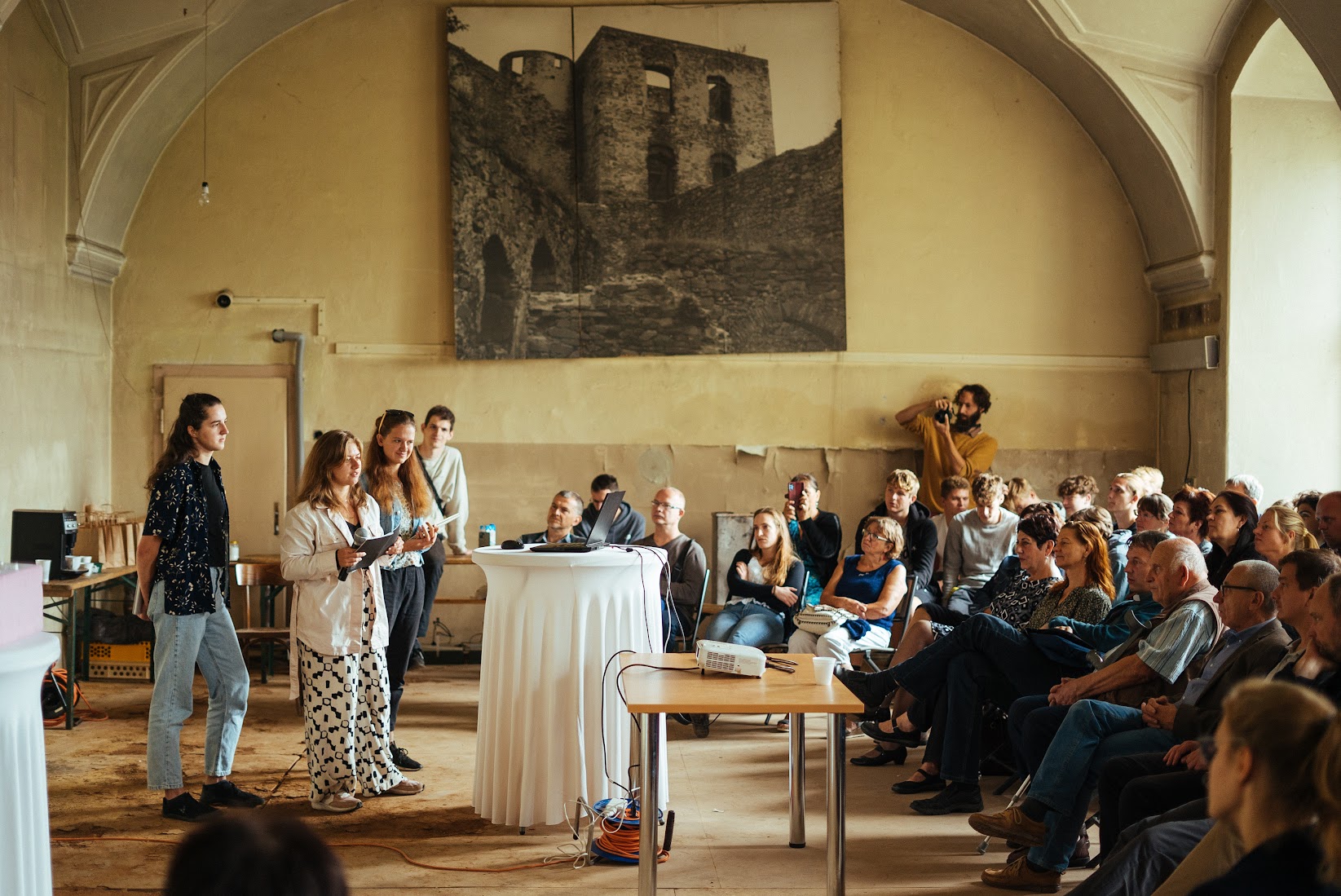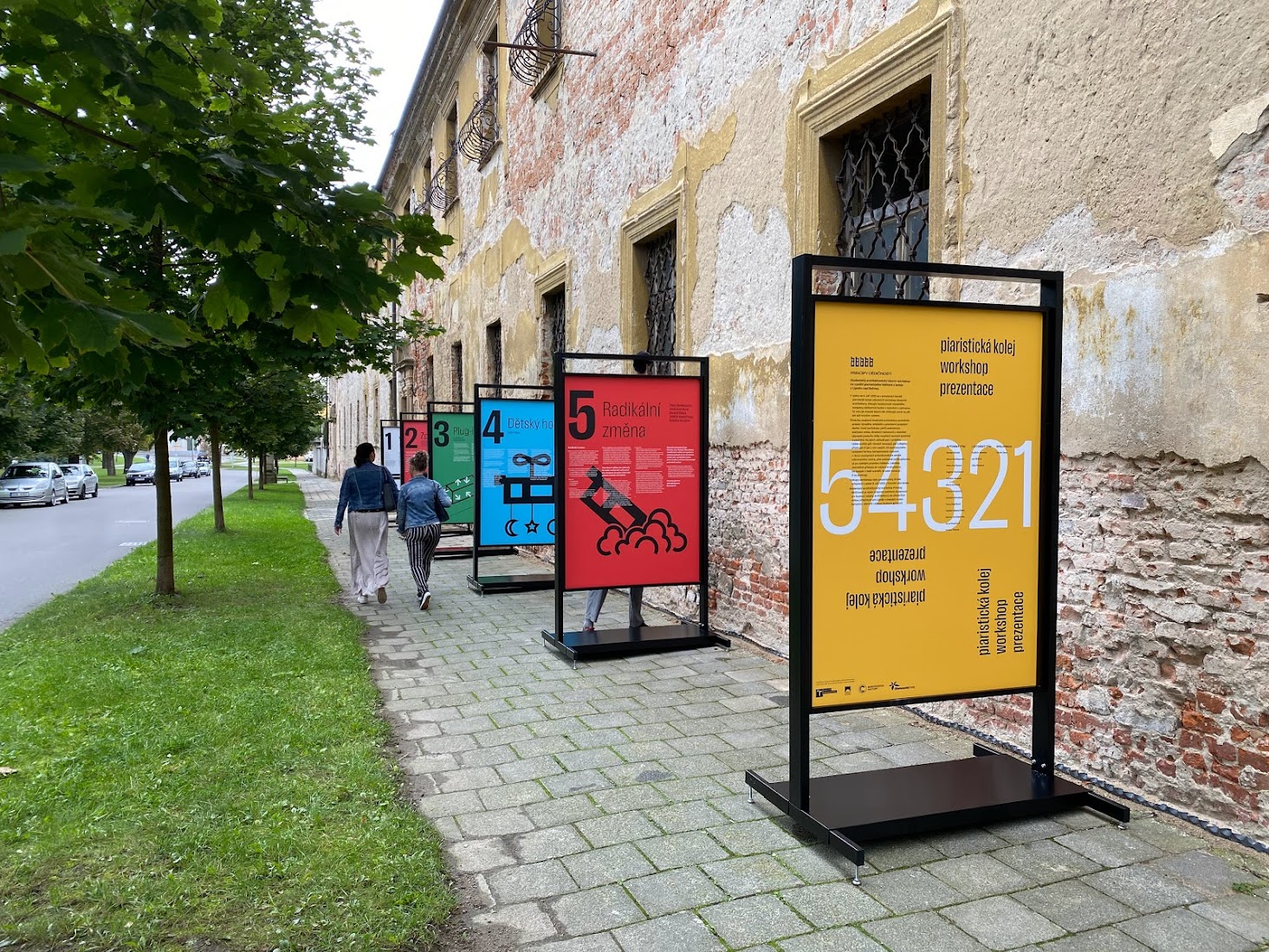(text is machine translated by DeepL)

The Piarist college in Lipník nad Bečvou has been given new hope
At the beginning of September, the architectural idea workshop Principles of Inheritance took place in Lipník nad Bečvou. The city has used the potential of young architects and can, on the basis of their comprehensive analyses, innovative ideas and unbiased expert views, revive the grounds of the Piarist monastery and college after many years.

Final presentations in the premises of the Piaristic Dormitory< /font>
complex of monastery buildings with a church and a garden. Principles of heredity, that was the title of the workshop, during which students analyzed the space and looked for new solutions. After more than twenty years, the dilapidated campus came alive with creative activity for five days.Thirteen students from the Brno Faculty of Architecture transformed the space of the former refectory into a temporary design studio. The introduction of the workshop belonged to detailed site analyses. A number of interviews with local residents provided a wealth of valuable input and insights. On their basis, during the week, five different concepts were created on how to approach the object or how to deal with it. From a simple display in the form of a composed exposition within the current guide activities of the information center, through gradual access to a radical transformation of the monastery and garden. The individual approaches are not mutually exclusive, but on the contrary, in a number of scenarios they follow or intertwine.

Exhibition of projects in front of the campus of the Piaristic College
The first concept shows the house right now, as it is, in its current state. "The house itself is so beautiful, multi-layered and mysterious that I came to exhibit it just as it is now. After all, the first step to establishing a relationship is always knowledge," comments Karina Shumlyanska on her intention. He proposes the opening of five routes that will guide potential visitors through the house and acquaint them with its history.
The relationship to the place is very important, and it is precisely in the case of the Piarist dormitory that it begins to slowly disappear, the younger generation is slowly dropping it from their viewfinders. The authors of the concept of accessibility, Dagmar Dvořáková, Alžběta Jansová, Petra Mojžíšová, Anna Vazačová, share this opinion: "Our goal is to make the house known to all generations, not to wait decades for an investor who could take over the building, but to bring it into the complex through a local initiative the monastery's life." Their intention is to get the house into the subconscious immediately, to open its doors with minimal investment, and to go step by step from making the gardens accessible to revitalizing the entire area. It is the process of gradual accessibility that should start the permanent habitation of the monastery.
"In our proposal, we approach putting the new heart of the house in its courtyards. These cores of the college will restore and rekindle life energy, and the former monastery will come closer to today's times. It is important to systematically open the house to the public, so that everyone can enter directly into the heart from the street. Such a solution will allow the dormitory to be fully used again and at the same time preserve its historical values," add Roman Bartoš and Tereza Macanová to their concept called Plug-in. Their design also deals with the technical security of the house, thinks about rainwater management, uses renewable resources.

Tereza Vítková comes up with the concept of a children's hospice, a center for children and their loved ones. It draws from history and returns children to the campus, but instead of school education, they will receive palliative care today. "Looking into history and thinking about the reason for building the building, I came to the conclusion that it was the mission of the Piarists who worked here and their task was to provide education even to children who did not come from rich families - thereby bringing them hope and joy in life. " adds the author.
The concept of radical change comes with three principles on how to approach the use of the monastery and the adjacent garden. We produce, we thicken, we tear down. These are the main ideas on the basis of which horticulture is opened, a new development is created, funds are obtained for the renovation of the dormitory and its operation, the area becomes a full-fledged partner for the current development of the city. "We don't have to destroy only matter, but also function. By tearing down traditional schemes, we would like to point out that the church can have a different function over time than the one for which it was originally intended." Diana Bevelaquová, Alena Dvořáková, Marie Křížková, Vojtěch Nejeschleba and Kateřina Novotná clarify the radical position. Thanks to a more radical concept, they open up the question of whether the object should be preserved over time, or whether it should radically enter the current organism of the city.

< br>
The outputs of the workshop were presented to the general public on Friday, September 9, 2022 in the main hall of the college. Now the panels with student themes and proposals are displayed directly in front of the monastery building, where you can view them and at the same time discover the atmosphere of the place for yourself and see the campus at least from the outside.
The student architectural workshop Principles of Inheritance is not only a significant positive experience for future adepts of architecture, but above all a great opportunity for Lipník to reflect on its wealth, identity and legacy to future generations.
The workshop was conducted under the guidance of a professional teaching team consisting of Ing. arch. Jitka Ressová, Ph.D., Ing. arch. Jana Mléčka, Ph.D., MgA. Ing. arch. Vojtěch Jemelka.
| Inserted by | Šoborová Adéla |
|---|---|
| Inserted |